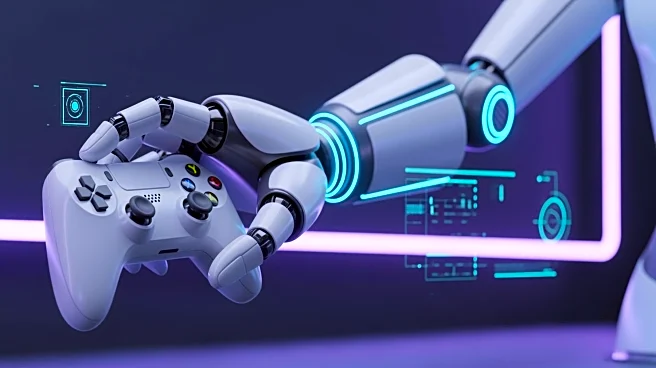What's Happening?
Dan Houser, co-founder of Rockstar Games, expressed his views on the integration of AI, particularly large language models (LLMs), into video game development. Speaking on the Lex Fridman podcast, Houser conveyed
a sense of cautious optimism, stating he is 'less scared than a lot of people' about AI's potential impact. He believes that while AI can be a useful tool, it is unlikely to replace human creativity, particularly in generating original ideas. Houser noted that AI has made significant strides in mimicking human-like writing, achieving about 90-95% of the work needed to sound human. However, he emphasized that the remaining 5% of development will require substantial effort. Houser also highlighted the historical pattern where new technologies promise to make processes easier and cheaper, yet often result in more complex and expensive outcomes.
Why It's Important?
Houser's perspective is significant as it comes from a leading figure in the gaming industry, which is increasingly exploring AI's capabilities. His comments underscore the ongoing debate about AI's role in creative fields, where concerns about generic outputs and the potential displacement of human talent persist. The gaming industry, a major economic sector, could see shifts in job roles and creative processes as AI tools become more prevalent. Houser's insights suggest that while AI can enhance certain aspects of game development, the core creative process remains reliant on human ingenuity. This balance between technology and creativity could influence how games are developed and the types of experiences they offer to players.
What's Next?
As AI continues to evolve, game developers may increasingly experiment with its applications, potentially leading to new tools and methodologies in game design. Stakeholders in the gaming industry, including developers, publishers, and players, will likely monitor these developments closely. The industry may see a push towards establishing best practices for AI use, ensuring it complements rather than replaces human creativity. Discussions around ethical considerations and the impact on employment may also gain traction, prompting industry leaders to address these challenges proactively.
Beyond the Headlines
The integration of AI into creative industries like gaming raises broader questions about the future of creativity and originality. As AI tools become more sophisticated, there may be a cultural shift in how creativity is perceived and valued. The potential for AI to produce 'generic' content could lead to a reevaluation of what constitutes originality and innovation in art and entertainment. Additionally, the ethical implications of AI-generated content, including issues of authorship and intellectual property, may become more pronounced, necessitating new legal frameworks and industry standards.










